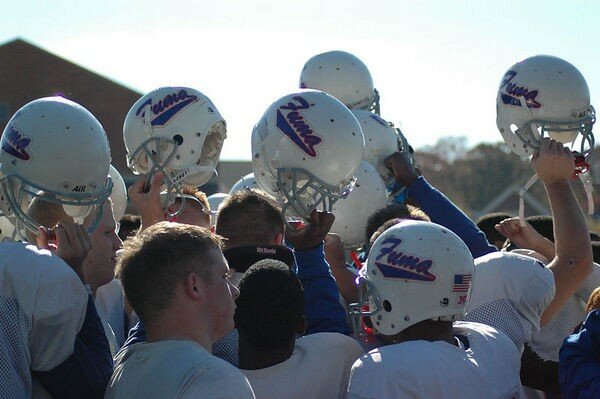NEWS- One (sore) subject: FUMA cleared in NCAA probe
Sixteen days after the NCAA singled out Fork Union Military Academy as one of 22 high schools in the country whose academic programs were subject to a highly publicized investigation, NCAA executive Kevin Lennon issued a statement following an official campus visit on July 21 that FUMA graduates are now officially eligible to compete at the collegiate level.
If FUMA could be so quickly cleared, why was the military high school publicly questioned in the first place?
"The issues identified centered on irregular course work and grade patterns during enrollment at Fork Union and utilization of course work from Fork Union to rectify NCAA academic deficiencies," says Lennon in a statement. Pressed for clarification about Fork Union's specific case, he says only, "I'd just refer you back to Fork Union."
As first reported in the Hook, FUMA athletic director and head prep football coach Micky Sullivan confirms that the NCAA's inquiry centered on the school's unique "one subject plan" in which students take one class at a time.
"They just didn't understand how the one-subject plan works," Sullivan says. "They wanted to know how this works, and does it work for the entire student body versus just student athletes. We showed them it does."
In the one-subject plan, cadets take one core subject at a time, five hours a day for seven weeks. FUMA says that the hours spent in class on each subject roughly equal or exceed the number at any other high school.
Lennon emphasized that never during the NCAA's investigation was Fork Union officially in trouble. "We had some questions that we needed answered, but they were never on a 'not cleared' list," he says.
This sentiment seems a far cry from the NCAA's original press release that listed Fork Union among 21 other schools "subject for future review" and right after a list of 15 more schools who were "not cleared" and "did not adequately respond to requests for information or submitted information that verified they did not meet NCAA standards."
Those lists were publicly released and often appeared side by side in national media outlets including the New York Times and the Washington Post, leading readers to wonder about FUMA's status.
"There's guilt by association in being named in the same newspaper with schools who have nothing to do with education," says Gene Corrigan, former commissioner of the Atlantic Coast Conference and a man who knows about the inner workings of collegiate athletics. "When I found out that [the NCAA] was putting Fork Union's name out there and then doing their investigation, I thought that was really arrogant, deplorable conduct. The NCAA owes them an apology for jumping on like that."
Lennon expressed no regret for distributing the list and making his investigation so public, saying, "The bottom line is that we carried it out the way we carried it out, and we're comfortable in the way we've done our work."
FUMA isn't nearly so "comfortable." Sullivan wishes the NCAA had been more discreet. "They put out a press release, but if [the investigation] had been done prior to the press release, there wouldn't have been a press release," he says.
Fork Union president John Jackson went one further, issuing a blistering press release of his own. "It is an unconscionable act to paint the Academy with the same brush as those who are mocking the system," he wrote. "This situation needs to be rectified by the NCAA at the speed of light, or irreparable damage will be the result."
And while FUMA has now been exonerated in the NCAA's eyes, the extent of the damage to the Academy's enrollment remains to be seen.
"That's a question we're not going to be able to answer until school starts," says Sullivan. "It will be very hard to tell until the numbers are in in September."

As first reported in the Hook, the NCAA's inquiry was about FUMA's "one-subject plan."
COURTESY OF FORK UNION MILITARY ACADEMY
#